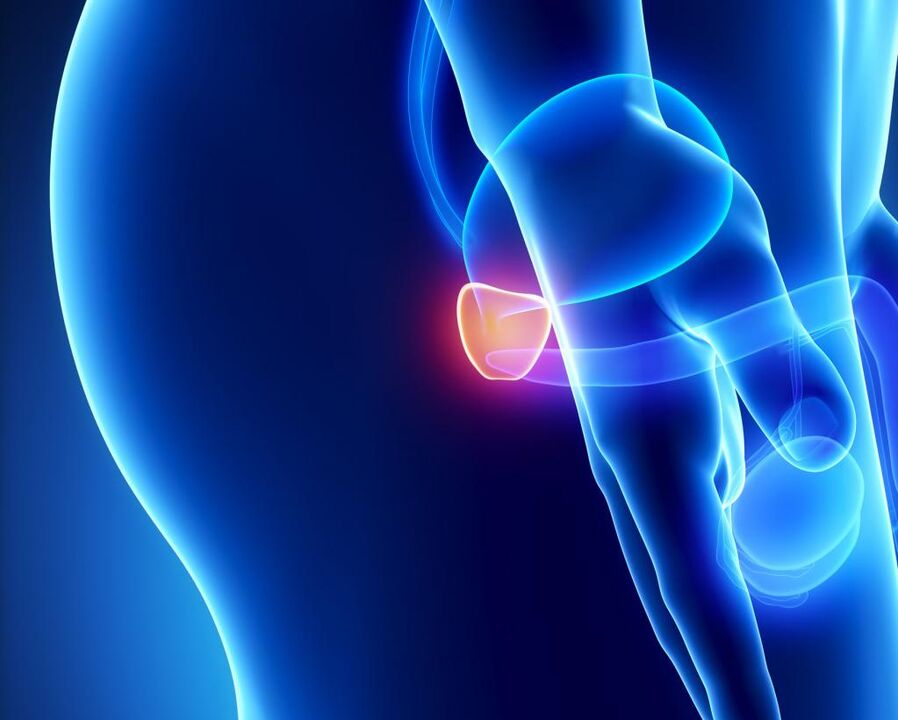
Prostatitis is a common disease that is often encountered by men of different age categories.Inflammation of the prostate gland brings a lot of inconvenience to a person’s life, and if left untreated, it inevitably leads to the development of dangerous complications.Of course, many people are looking for more information about pathology.
Why does inflammation develop?How to determine prostatitis in a man, and can you do it yourself?What treatment methods does modern medicine offer?How dangerous is prostate cancer?
General information about the disease
What are the causes of prostatitis in men?Signs and symptoms, complications and treatment are important things to learn.But first we should consider some general information.
Prostatitis is a disease that is accompanied by inflammation of the prostate tissue.As you know, this is an unpaired small organ located under the bladder - it actually covers the urinary canal.The prostate produces a secretion that is part of semen.
Statistics show that the disease most often affects people aged 25–50 years.Approximately 50–85% of patients aged 50 years and older have experienced some form of prostate inflammation at least once in their lives.
As you can see, this is a very common illness.This is why men are looking for additional information.How do you know if you have prostatitis?What symptoms should you look out for?Are there effective treatments?
Causes of prostatitis development.Predisposing factors
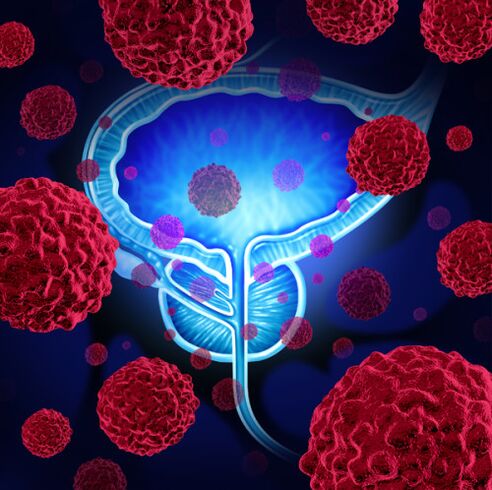
Many men are interested in questions about what are the first signs of prostatitis.Symptoms and treatment, possible complications and diagnostic features are very important information.But first, it’s worth considering the reasons for the development of the inflammatory process.
The cause of the inflammatory process is the activity of pathogenic microorganisms.The infection may be specific.For example, prostatitis is a consequence of a sexually transmitted disease.If we are talking about nonspecific inflammation, then the cause is the activity of staphylococci, streptococci, and E. coli.Sometimes prostatitis develops against the background of herpes.Of course, there are risk factors, the impact of which can trigger the start of the inflammatory process.
- To begin with, it is worth noting that the disease can develop against the background of other infectious diseases, including a cold.
- Risk factors include irregular sex life.For example, promiscuity increases the likelihood of infection in the body.Long-term abstinence is also harmful.Ideally, sex life should be regular, preferably with the same partner.
- Prostatitis often develops against the background of stagnant processes in the pelvic area.Risk factors include sedentary work and a sedentary lifestyle.
- Hypothermia (both general and local) can also trigger the development of the inflammatory process.
- Risk factors include chronic constipation and other digestive tract disorders.
- The inflammatory process can be the result of urethral reflux, which is accompanied by the reverse flow of urine and its reflux into the genital ducts.This disorder is often associated with inflammatory diseases of the urethra or improper catheterization of the bladder.
- Changes in hormonal levels are also potentially dangerous, especially when it comes to a decrease in the level of male sex hormones.By the way, this is why mature and elderly men are more likely to experience prostatitis.
- Risk factors include constant stress and nervous tension, errors in diet (in particular, excess spicy food), and alcohol abuse.If there are prerequisites, these factors can provoke the development of an inflammatory process or an exacerbation of chronic prostatitis.
The doctor should know not only how to determine prostatitis in men.It is very important to find out what exactly triggered the development of the disease.
Prostatitis in men: how to recognize?Description of the main symptoms
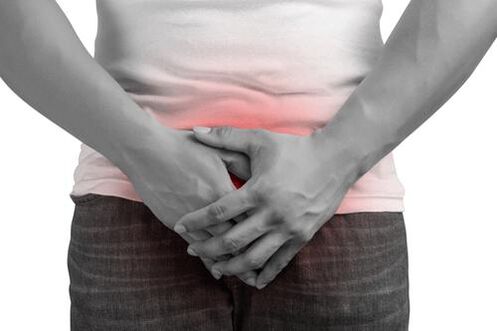
We have already become familiar with the main reasons for the development of the inflammatory process.But many men are interested in questions about how to determine prostatitis on their own.In fact, this is impossible, because tests and examinations are required to confirm the diagnosis.But you can suspect the disease by noticing very characteristic signs.
- How does prostatitis manifest in men?Symptoms of the disease include various urinary disorders.Patients complain of increased urge.At the same time, the daily volume of urine does not increase.The urge appears even before the bladder is full.
- An enlarged prostate gland puts pressure on the urinary canal, causing the stream of urine to become weak and often interrupted.Sometimes, in order to have a bowel movement, a man has to make an effort and strain his abdominal muscles.
- The urge to urinate also becomes more frequent at night - a man sometimes wakes up several times (or even dozens of times) during the night, which affects the quality of rest.
- Often the process of urination is accompanied by unpleasant sensations, and sometimes severe, cutting pain.
- If we are talking about acute inflammation (especially if it is accompanied by the accumulation of purulent masses), then the body temperature may rise to 37–39 degrees.
- Patients complain of pain in the perineum, which intensifies during physical activity, sexual intercourse, and defecation.Sometimes the pain is very sharp, almost unbearable.
- Sometimes the urine contains blood.This is a dangerous symptom that should not be ignored.Hematuria may indicate rupture of an abscess, the development of urolithiasis, or a malignant form of hyperplasia.
- Problems with erection also appear, although this does not happen in all cases (especially if we are talking about an acute form of the inflammatory process).
These are the main signs of prostatitis in men.They should not be ignored under any circumstances - be sure to go to the doctor as soon as the first disturbances appear.
Features of chronic inflammation

You have already become familiar with the main signs of prostatitis in men (how to find out whether a person has the disease will be discussed below).Statistics show that the acute form of the disease, in the absence of timely treatment, sometimes develops into chronic prostatitis.Sometimes the chronic form of inflammation is primary - its first stages occur with hidden symptoms.In most cases, this type of disease is the result of stagnant processes in the pelvic area.
The symptoms of the disease remain the same.Patients complain of pain in the perineum and problems with urination.Sometimes there is discharge from the urethra during bowel movements.Men often encounter problems in their sexual life - it is possible to develop erectile dysfunction, the appearance of unpleasant sensations during sex and during ejaculation.Occasionally, chronic prostatitis leads to complete impotence.This form of the disease is much more difficult to diagnose and treat.
What complications can the disease lead to?

You already know what symptoms you need to pay attention to and how to identify the disease.Prostatitis is a dangerous disease that should not be ignored under any circumstances.There is a possibility of very dangerous complications.
An acute inflammatory process is often accompanied by suppuration of the gland and the formation of an abscess.An enlarged prostate compresses the urinary canal, which can lead to acute urinary retention.In addition, the abscess can open on its own, resulting in purulent masses entering the urinary system or intestines.
Chronic prostatitis is no less dangerous, because it leads to the gradual replacement of glandular tissues with connective tissues, the formation of scars and stones.Chronic inflammation affects potency and causes erection problems.In addition, the affected gland cannot produce high-quality secretion to support the vital activity of sperm, which leads to problems with conception and sometimes infertility.
How to identify prostatitis in men?List of diagnostic measures
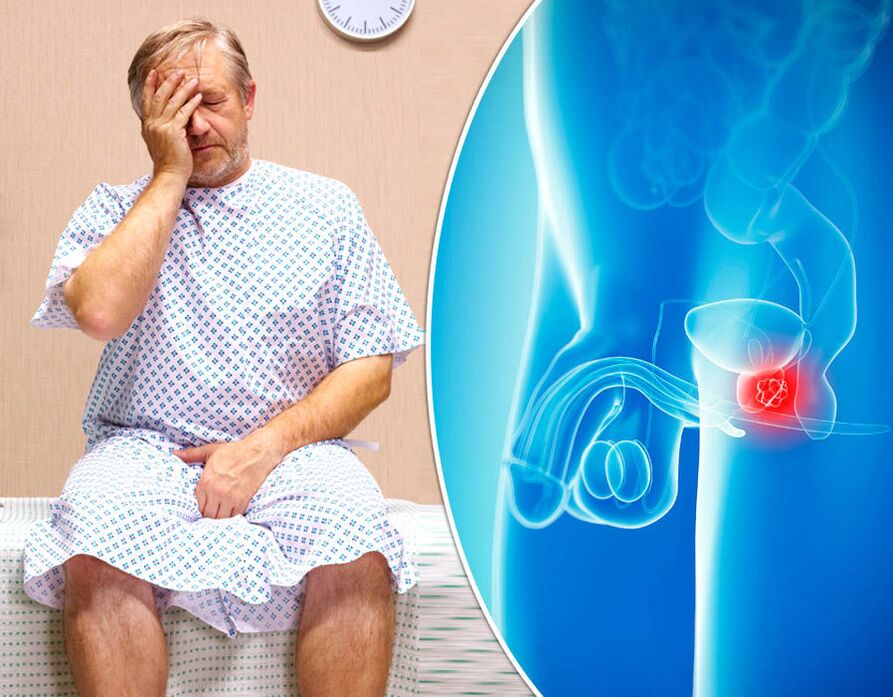
If you observe the above symptoms, you should consult a specialist.How to diagnose prostatitis?In this case, a variety of procedures are widely used.
- To begin with, the doctor collects information about the symptoms that bother patients, the presence of certain diseases, and lifestyle.
- The gland itself needs to be examined.How is a prostate test done in men?Palpation is carried out rectally.During the procedure, the doctor may note an enlargement of the prostate gland and a change in its structure.If we are talking about an inflammatory process, then palpation is often accompanied by very unpleasant, painful sensations.
- During a rectal examination, samples of prostate secretions are often taken for analysis.If it contains bacterial microorganisms, and the acidity of the environment is increased, then this indicates the presence of an inflammatory process and the activation of one or another infection.
- A smear from the urethra is mandatory.This procedure is unpleasant, but very informative.Samples are sent for PCR diagnostics and bacterial culture.The study helps to detect and identify infectious diseases, including sexually transmitted diseases.
- A general urine and blood test is performed to confirm the presence of an inflammatory process in the body.
- The diagnostic scheme also includes cystoscopy.Using special equipment, the doctor examines the urethral canal and bladder from the inside.This makes it possible to detect certain diseases of the urinary system.
- Uroflowmetry is also mandatory.The procedure allows you to determine the speed of urine flow.This is important when diagnosing prostatitis and hyperplasia.
- How to determine prostatitis in men?Ultrasound of the prostate gland is mandatory.This is a simple, accessible and painless procedure that makes it possible to examine the gland, determine its size and shape, detect existing stones, etc.
- Sometimes (if an accurate diagnosis cannot be established) the patient is sent for magnetic resonance imaging.
Drug treatment
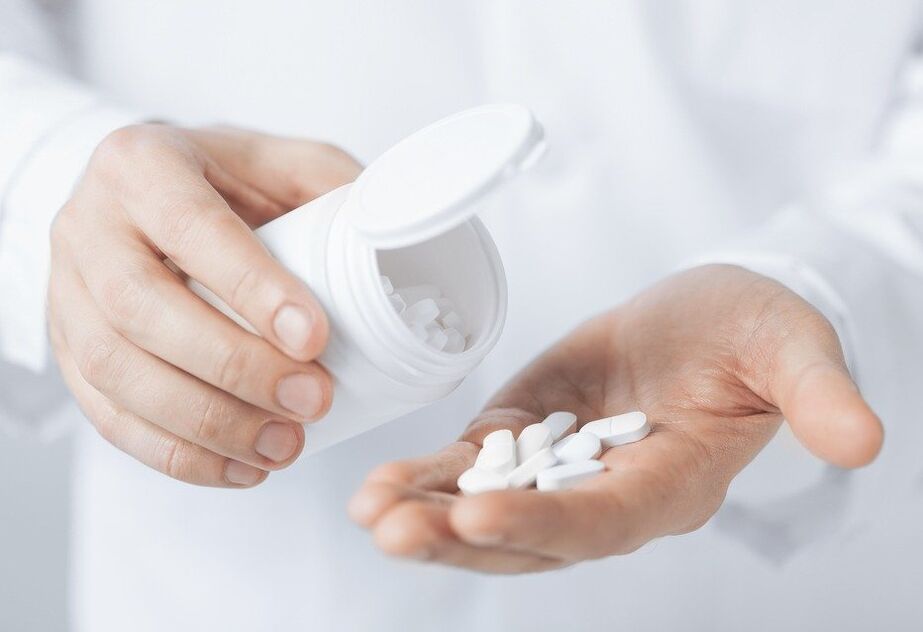
You already know how to determine prostatitis in men.After a thorough diagnosis, the doctor will definitely draw up a treatment regimen - it is individual in each case, as it depends on the cause of the development of the disease, the characteristics of the course, etc.
Hospitalization is indicated only in cases of severe intoxication and suspected abscess formation.In all other cases, treatment is carried out on an outpatient basis.
Since the inflammatory process is associated with the activity of bacterial microorganisms, antibiotics must be included in the treatment regimen.Symptomatic treatment is also carried out - patients are prescribed anti-inflammatory, painkillers, and antipyretic drugs.If there is an abscess, a procedure is performed to open it.
You already know what the main symptoms of prostatitis in men are.And the first signs are a good reason to immediately consult a doctor.The fact is that the acute form of inflammation very quickly becomes chronic.The symptoms become less pronounced, but irreversible changes occur in the tissues of the gland, which can no longer be corrected.
Physiotherapeutic procedures
Physiotherapy is necessary for the chronic form of the disease - this is the only way to stop the disease.Naturally, patients take antibacterial drugs, and the courses of treatment are quite long (sometimes 2–3 months).
Prostate massage is mandatory (it is contraindicated during periods of acute inflammation).During the procedure, it is possible to normalize the outflow of prostate secretions, as well as improve blood microcirculation (and, accordingly, tissue nutrition).
Patients are sent for laser and ultrasound therapy sessions.Sometimes warm microenemas with special medicinal solutions are performed.The treatment regimen also includes immunomodulatory drugs.
Diet for prostatitis
You already know about the symptoms and treatment of prostatitis.Signs in men may vary, as well as treatment regimens.But in any case, treatment must be supplemented with an appropriate diet.
- The basis of the diet should be vegetables and fruits, salads dressed with olive oil, nuts, and dried fruits.
- It is allowed to consume soups, broths, lean meats and fish, but only boiled or baked.Various cereals will be useful.
- But you will have to give up fatty meat, eggs, flour products, and butter for a while.The fact is that regular consumption of such products increases the level of cholesterol, which is deposited on the walls of blood vessels, impairing blood circulation in the prostate gland.
- Spicy foods and spices, pickles, canned foods, semi-finished products, too salty foods, and smoked foods are contraindicated.Such foods irritate the intestinal walls and retain water in the body.
- You need to give up alcoholic drinks.It is important to drink enough fluids.Fresh juices will be beneficial.But in the evening, the amount of water consumed should be limited - this will reduce the number of night trips to the toilet.
Agree, this diet does not provide for too strict dietary restrictions.But by following such a diet, you can really speed up the healing process, improve the functioning of the digestive tract, and strengthen the immune system.
Prostatitis and sexual activity

You already know how to find out if a man has prostatitis.But many patients are interested in questions about whether it is possible to maintain sexual activity during treatment.
It’s immediately worth noting that regular sex life directly affects the condition and functioning of the prostate gland.Both too frequent, promiscuous relationships and periods of prolonged abstinence are potentially dangerous.
But if the inflammatory process is already taking place, then you should give up sexual activity for a while.Of course, prostatitis is a purely male disease and in most cases is associated with the activity of nonspecific microorganisms, and therefore cannot be transmitted during sexual intercourse.However, a man’s semen contains various products of the inflammatory process that negatively affect the functioning of the organs of the female reproductive system.It is better to wait until complete recovery and only then engage in sexual relations again.
Prevention: how to prevent the development of the disease?
We have already figured out the information about what functions the prostate performs in men, how can we find out if the organ is inflamed?If the disease is not diagnosed in a timely manner and treatment is started too late, it can lead to the development of a huge number of unpleasant complications.That is why it is much easier to try to prevent the development of the disease.
There is no medicine that would protect the prostate gland from inflammation.However, following some recommendations will help significantly reduce the risk of developing the disease.
- Doctors recommend carefully monitoring personal hygiene and avoiding wearing too tight synthetic underwear.
- Remember that prostatitis can be caused by sexually transmitted infections.Therefore, you should give up promiscuity and use condoms.
- Nutrition also plays an important role.Together with food, the body must receive a sufficient amount of nutrients, fiber, minerals and vitamins.
- Physical activity (gym classes, active recreation, daily jogging or walking) prevents blood stagnation in the pelvic organs, which also reduces the likelihood of developing an inflammatory process.
- Doctors recommend giving up alcohol, smoking and other bad habits.
- It is very important to strengthen the immune system.Hardening and preventive intake of vitamin complexes will help with this.
- It is worth reducing your overall stress level and learning to cope with adverse situations.Remember that nervous tension directly affects hormonal levels and often leads to a decrease in the activity of the immune system and the development of certain diseases.
Men over 40 years of age are required to undergo an annual examination - only this can guarantee timely diagnosis of prostatitis.How to identify a disease, how to draw up a treatment regimen, how to prevent the development of complications - only a doctor knows about this.You should not ignore the problem, much less try to deal with it yourself.






























